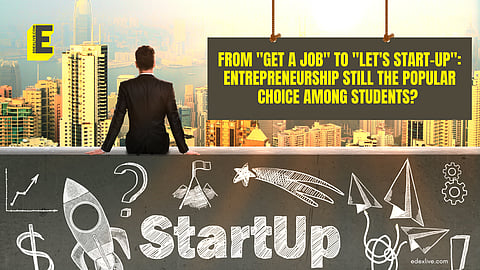

In the bustling lanes of Bengaluru, crowded Mumbai metros, thriving tech hubs of Hyderabad and many more places in our country, a new wave of ambition is coming to light.
Is the era when a secure 9-to-5 job was the ultimate dream fading away for good?
Today's Indian youth are ready to explore beyond conventional career paths, armed with nothing more than the spark of a little idea and a strong belief in their potential!
YuWaah, an initiative by UNICEF, conducted a pulse survey in March 2025 to understand how young people perceive entrepreneurship.
According to YuWaah's report, entrepreneurial inclination among youth is very high, with 81% aspiring entrepreneurs.
The start-up bug seems to have bitten the young generation, and they're not just dreaming; they're building and innovating, one pitch at a time.
But what makes entrepreneurship a desirable career goal for youngsters?
To explore and understand the heart of India's new entrepreneurial spirit, EdexLive interviewed two young business minds, Gayatri Mehta, Founder of Genie, an event management company and Kruthivarsh Koduru, Co-founder of WTMF (What's the Matter, Friend?), an empathetic, supportive Artificial Intelligence (AI) chatbot.
Gayatri Mehta shares her inspiration for doing what she does: "Working for others never truly fulfilled me. I didn't feel the drive because I always wanted to do more. That's when I realised I wanted to build something of my own, something I could be proud of."
Many youngsters, who, like Gayatri, are increasingly inclined to choose the uncertain path of entrepreneurship over any traditional job, echo this sentiment.
Kruthivarsh Koduru expresses his motivation to create WTMF, "We've seen firsthand how powerful it can be when someone simply feels heard. We believe that everyone deserves to feel acknowledged and understood. That's why we set out to create WTMF. Our goal is to make emotional support accessible to anyone, anytime."
According to the Economic Survey 2024, the number of Department for Promotion of Industry and Internal Trade (DPIIT)-recognised start-ups increased to more than 1.25 lakh by 2024 from 300 in 2016, most of which are from Tier-1 and Tier-2 cities, and are run by young, first-generation entrepreneurs.
Additionally, increased access to technology turns entrepreneurship from a tedious task to an accessible activity.
Young people can now learn, ideate, and launch their businesses without the hassle of paperwork, high upfront costs, and slow local marketing, aided by digital tools, global reach, and easy access to funding.
Kruthivarsh's team leverages AI models, memory stacks, and low-code tools to develop WTMF, emphasising speed and flexibility. Social media remains crucial for their marketing.
Gayatri, too, credits social media and personal networks for helping Genie gain visibility, though she includes that word-of-mouth remains a powerful driver.
Interestingly, there seems to be a growing societal acceptance, and maybe even admiration, for such ventures.
"I'm lucky to have a very supportive family who encouraged me to pursue entrepreneurship. Their belief in me gave me the confidence to take the leap.", Gayatri remarks.
However, the journey isn't complete without its hurdles. Despite their enthusiasm, young entrepreneurs face significant challenges.
"The biggest challenge was not being taken seriously because of my age. Vendors and even a few clients would ask questions like, 'Are you sure you can handle this?'" Gayatri shares, highlighting a common barrier young founders face: scepticism from the ecosystem.
But she explained that later on, her work did speak for itself, and she could gain their confidence.
But Kruthivarsh has a different viewpoint, "It's way better than before. There's more awareness, and honestly, people are actually listening to young founders now.", he says.
He describes many start-ups' resource constraints, "We're still figuring out the balance between building great emotional AI and making it work smoothly on a budget. We're testing a lot, learning fast, and staying scrappy."
The Indian start-up ecosystem has evolved to support these young visionaries better. Kruthivarsh notes, "We're applying to incubators for mentorship and support and slowly figuring our way through the process."
Government initiatives like Startup India and various incubator programmes have played a crucial role in creating a more accessible environment for new entrepreneurs.
"The ecosystem is growing, and there's much potential, especially for youth and women. Government and banking initiatives are increasingly supportive, encouraging young founders looking to start something of their own," Gayatri.
The impact of youth-led start-ups extends beyond business success. Start-ups like Genie and WTMF demonstrate how young entrepreneurs are not just building businesses — they are creating social impact.
Gayatri explains Genie's commitment to inclusivity, "We actively hire students, women, and freelancers, giving them flexible roles that promote a healthy work-life balance. We also support local vendors and artists, contributing to economic and creative ecosystems."
And Kruthivarsh's WTMF tackles mental health, a critical issue often overlooked in India, aiming to provide accessible emotional support through AI.
Looking ahead, both founders are optimistic.
Gayatri advises aspiring entrepreneurs, "Just start. If the idea is in your head, take action; don't wait for the perfect moment. Failure is okay. You can always try again."
Kruthivarsh shares goals for WTMF: "In the short term, we want 2.5 lakh users talking to WTMF. Long-term, we want to be the emotional AI platform built in India for the world."
As India moves towards 2047, its youth are turning dreams into start-ups, pulling coffee-fueled all-nighters to make game-changing innovations!
